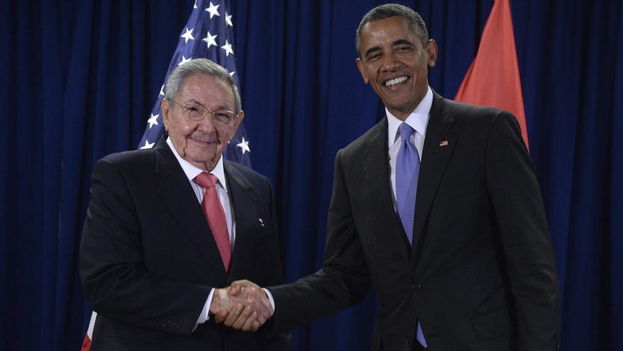
![]() 14ymedio, Reinaldo Escobar, Havana, 17 December 2015 – Perhaps the most visible impact of the restoration of relations between the US and Cuba, begun a year ago today, is expressed in the hopes that it awoke in third countries. Governments, businesses and independent institutions, sensing that the starting pistol had been fired, raced to position themselves, not in today’s Cuba, but in the one they imagined it would soon be, by virtue of the announced change.
14ymedio, Reinaldo Escobar, Havana, 17 December 2015 – Perhaps the most visible impact of the restoration of relations between the US and Cuba, begun a year ago today, is expressed in the hopes that it awoke in third countries. Governments, businesses and independent institutions, sensing that the starting pistol had been fired, raced to position themselves, not in today’s Cuba, but in the one they imagined it would soon be, by virtue of the announced change.
Letters of intent from the capitalist world multiply and presidents and ministers, musicians and baseball players, filmmakers and entrepreneurs arrive on the island. All of them calculating that the streams of dollars will soon flood the country.
What has happened here is just like in the stories about the simple announcement of the coming of a railroad; the land on either side of the proposed tracks goes up in price. But the date when the train will arrive remains unknown.
The Americans have been clear that they have not changed their objectives, only their methods. The Cuban leaders insist on not moving even an inch from positions they classify as “the unshakable principles of the Revolution.”
Raul Castro’s advantage over Barack Obama is that he doesn’t have a parliament demanding equity in the steps taken, nor does his party have to subject itself to the scrutiny of an electorate jealous of every concession, calculating every gain. But this advantage only helps him do nothing. The American negotiators no longer know how they are going to alert the Cuban side that Obama is not the dictator of the United States, but only its president, and that if there are no signs from Havana in the hoped for direction, those in Congress who oppose the policy of rapprochement will be proven right.
What are the signs that the Americans are eager to see? First, guarantees that they can invest and reap dividends from their investments. Second, respect for all human rights. The relationship between both aspirations deserves a book, but can be reduced to the idea that an atmosphere of economic and political freedom is the environment most supportive of a market economy.
The resistance to turning the wheel in that direction is adorned or masked – according to how one prefers to see it – with the political will to guarantee certain margins of social justice expressed in the highly publicized achievements in health and education within reach of everyone. Behind it all, there is a group of hierarchs obsessed by power who do not want to risk it. Venezuela just proved it: authoritarian regimes cannot trust in democracy, “not the least little bit,” as an Argentinean* was known to have said.
In Cuba there is a repressive apparatus made up of tens of thousands of individuals charged with blocking opponents from expressing themselves or meeting together. If the country democratizes, they will not only lost their jobs and privileges, but they feel they would be victims of revenge. So the officials in charge of each case strive to make their reports convincing and every opponent appears as a traitor and a dangerous agent of imperial forces. This troop, well trained and well armed, has been educated in the principal that the only order that can and must be disobeyed is the order to “cease fire.” If Raul Castro were to try to decriminalize political dissent in order to democratize the country, he would be converting his most loyal and submissive servants into his potential enemies. And he knows it.
One year after that hopeful 17 December, it can be affirmed that each party has reached the ceiling of its possibilities. Repealing the embargo, suspending the American-taxpayer-financed radio and TV broadcasts from Florida to Cuba, paying compensation for damages caused by American policies, returning Guantanamo to Cuba, all seem to be gestures too difficult for the White House; as difficult as it would be for the Cuban government to introduce a multi-party system, ratify the United Nations covenants on human rights, allow free enterprise, or legitimize independent civil society.
The lands purchased on either side of the railway line began to depreciate today, because the damn train is not about to run down the rails any time soon.
Translator’s notes:
*Like Americans say “9-11” instead of “September 11, 2001,” Cubans say “17D” instead of “17 December 2014,” the day Barack Obama and Raul Castro jointly announced the restoration of relations between the United States and Cuba.
**The phrase is associated with Ernesto “Che” Guevara. In Spanish: “ni tantico así.”
